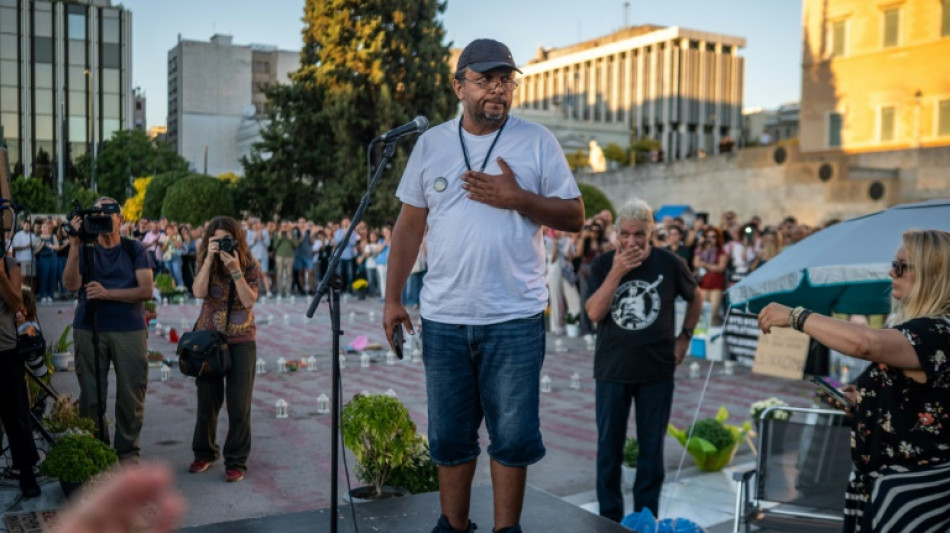The photo of Denis, who died in Greece's worst rail disaster, is prominently displayed in front of the country's parliament, where his father has been on hunger strike for nearly two weeks.
Panos Ruci, 48, has camped outside the building since September 15, asking the Greek state for permission to exhume his 22-year-old son's remains in order to determine his cause of death.
Of the 57 people who died on the night of February 28, 2023, when a passenger train and a freight train collided near the central city of Larissa, the majority died in the crash.
But some families, backed by experts, suspect that their loved ones were killed by an explosion attributed to undeclared chemicals on board the freight train.
Compounding his pain, Ruci has said he is not even certain that the charred remains delivered to him after the accident actually belong to his son.
"For two and a half years, I have been unable to find justice," he told AFP, sitting under a tent, surrounded by nearly a dozen supporters.
Ruci, with his black cap on his head, looked exhausted.
He has been giving non-stop interviews and in recent days has received visits from politicians, unionists, journalists, students, and ordinary citizens.
- 'Don't cry' -
A group of young women broke down in tears near him.
"Don't cry. I want bright faces," he told them.
"I am very tired. What matters to me is simply getting the truth about what happened to our children," he told taxi drivers who came to support him.
The tragedy, the lack of safety systems in rail transport, and alleged flaws in the investigation have caused massive strikes and hundreds of protests in Greece over the past two years.
After the crash, protesters wrote the victims' names in red paint on a square behind parliament, opposite the Tomb of the Unknown Soldier, Greece's foremost military monument.
Passersby have left flowers, candles and small notes to honour their memory.
Although the investigation concluded at the end of August, the victims' families allege that valuable evidence was lost when the accident site was cleared shortly after the crash.
They also say that there were no toxicology tests to determine whether the freight train was carrying undeclared chemicals -- something which operating company Hellenic Train has denied.
Maria Karystianou, who lost her daughter in the crash and has led a campaign to shed light on the investigation, said this week that DNA tests were "completely absent" from her daughter's case file.
"This story outrages me," said Kostas Kapis, a man in his sixties who came to support Ruci.
"Two years on, we still don't know exactly what happened and political officials have yet to be judged."
More than 40 people have been prosecuted over this collision, including the station master responsible for directing the trains that night.
Two senior officials, including the former transport minister, have been referred to justice.
But they face only misdemeanour charges, which has infuriated victims' relatives.
"This disaster reflects the entire state of decay our country is in," said Vassilis, a 22-year-old student at the hunger strike site.
"We can't trust public transport, hospitals or state schools!" he said, voicing outrage that even after the tragedy, conservative Prime Minister Kyriakos Mitsotakis had been comfortably re-elected with over 40 percent of the vote.
According to recent polls, a large majority of Greeks believe the government attempted to conceal evidence about the cause of the accident.
Supreme Court Prosecutor Constantinos Tzavellas said on Friday the families' requests for exhumation "are being reviewed and will soon receive a response".
The trial is not expected to begin before next year.
I.Kusters--LCdB
